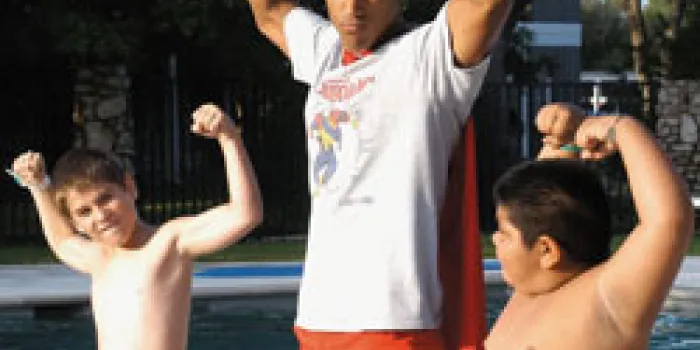See the NHF Camp Directory.
When I was growing up, Camp Ailihpomeh was more than just a week away from my parents to hang out in the boonies of Central Texas. It was a time every year that I looked forward to as much as Christmas or my birthday, if not more. The memories I have from the 12 years I spent there are pieces of a puzzle that describe who I am.
I’m sure that kids with bleeding disorders understand the restrictions that are put on them in terms of being active. It was always difficult to explain to my friends that the reason I couldn’t play certain sports was that the consequences of getting injured were much more severe for me than for them. But at Camp Ailihpomeh, it wasn’t the same scenario. There, I was surrounded by 100 other boys who were in the same boat. They understood their diagnoses, and it created a bond among us. This is one reason Camp Ailihpomeh was such a perfect place for kids with bleeding disorders.
Another reason was the sanctuary it created for kids, including me, who absolutely loved playing sports and games. One of my favorite experiences was conquering the challenge/ropes course. We had to navigate our way up a 20-foot wall or across cables suspended in the air. At camp, there were activities for everyone: arts and crafts, swimming, horseback riding and canoeing. All these activities allowed kids to express themselves and participate in something new in a safe environment. Camp Ailihpomeh was a weeklong getaway where kids and young adults with the same bleeding disorders could escape their lives back home and find camaraderie.
The atmosphere at camp is very positive and influential. At Camp Ailihpomeh, once you reach the age of 15, you’re no longer considered a camper. Instead, you enter a three-year leadership program designed specifically for teens. The program teaches life skills such as leadership, responsibility and brotherhood. The team-building exercises are some of the most important aspects of the program and teach communication, trust and working together. All of these skills are crucial in the transition from childhood to adulthood.
Another benefit of Camp Ailihpomeh is the educational program that was designed for the campers by nurses and doctors from HTCs all around Texas. Each day for about 45 minutes, the nurses and doctors gather a group of campers and teach them about bleeding disorders and ways to take care of themselves, such as learning and understanding the first signs of a bleed or ordering their own factor. Without question, though, the most important educational tool—taught to campers as young as 7 years old—is how to self-infuse. The leadership program, because of its focus on young adults, takes the educational program a step further and applies it to life now and in the future. It expands on the information taught to the younger kids, discussing important issues such as finding an appropriate insurance company, getting involved in the bleeding disorders community and even sex education.
After I graduated from the program, I returned as a full-time staff member for Camp John Marc, the facility that hosts Camp Ailihpomeh. In fact, Ailihpomeh is one of 10 camps that John Marc hosts throughout the summer. Each camp is specialized to serve kids who have a specific chronic disorder such as cancer, heart disease or spina bifida. Last summer I met and worked with some very brave and outstanding kids. Even though I had been to camp before, it was a completely different experience seeing how camp affected everyone from the moment they stepped off the bus until they left a week later. Many kids were sad, homesick or even scared the first couple of days, but became comfortable with everyone as the week went on. The friendships they made were amazing to witness. Countless times I saw teenagers and even some of the little kids go out of their way to help a friend in need. Sometimes it’s hard to believe that this group of people who see each other for only five days out of the year can show such kindness and brotherhood.
Summer camps are a crucial element in a young teen’s growth to adulthood. They remove teens from their everyday environments and teach skills that create leaders in our communities. The education about treatment received at camp, along with the leadership skills and lasting relationships developed by the kids, are the prime reasons why youth camps are absolutely critical to the overall healthy development of young kids growing into teens and all the way to adults.
[Steps for Living: All About Camps]
Sean Leaks, 19, is a student at the University of South Carolina in Columbia. He is majoring in sport and entertainment management.

